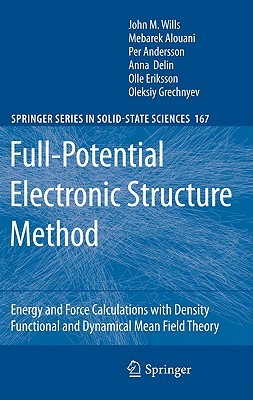
- We will send in 10–14 business days.
- Author: John M Wills
- Publisher: Springer
- ISBN-10: 3642151434
- ISBN-13: 9783642151439
- Format: 15.5 x 23.4 x 1.8 cm, kieti viršeliai
- Language: English
- SAVE -10% with code: EXTRA
Reviews
Description
This is a book describing electronic structure theory and application within the framework of a methodology implemented in the computer code RSPt. In 1986, when the code that was to become RSPt was developed enough to be useful, it was one of the ?rst full-potential, all-electron, relativistic implem- tations of DFT (density functional theory). While RSPt was documented p- asitically in many publications describing the results of its application, it was many years before a publication explicitly describing aspects of the method appeared. In the meantime, several excellent all-electron, full-potential me- ods had been developed, published, and become available. So why a book about RSPt now? The code that became RSPt was initially developed as a personal research tool, rather than a collaborative e?ort or as a product. As such it required some knowledge of its inner workings to use, and as it was meant to be m- imally ?exible, the code required experience to be used e?ectively. These - tributes inhibited, but did not prevent, the spread of RSPt as a research tool. While applicable across the periodic table, the method is particularly useful in describing a wide range of materials, including heavier elements and c- pounds, and its ?exibility provides targeted accuracy and a convenient and accurate framework for implementing and assessing the e?ect of new models.
EXTRA 10 % discount with code: EXTRA
The promotion ends in 21d.05:01:27
The discount code is valid when purchasing from 10 €. Discounts do not stack.
- Author: John M Wills
- Publisher: Springer
- ISBN-10: 3642151434
- ISBN-13: 9783642151439
- Format: 15.5 x 23.4 x 1.8 cm, kieti viršeliai
- Language: English English
This is a book describing electronic structure theory and application within the framework of a methodology implemented in the computer code RSPt. In 1986, when the code that was to become RSPt was developed enough to be useful, it was one of the ?rst full-potential, all-electron, relativistic implem- tations of DFT (density functional theory). While RSPt was documented p- asitically in many publications describing the results of its application, it was many years before a publication explicitly describing aspects of the method appeared. In the meantime, several excellent all-electron, full-potential me- ods had been developed, published, and become available. So why a book about RSPt now? The code that became RSPt was initially developed as a personal research tool, rather than a collaborative e?ort or as a product. As such it required some knowledge of its inner workings to use, and as it was meant to be m- imally ?exible, the code required experience to be used e?ectively. These - tributes inhibited, but did not prevent, the spread of RSPt as a research tool. While applicable across the periodic table, the method is particularly useful in describing a wide range of materials, including heavier elements and c- pounds, and its ?exibility provides targeted accuracy and a convenient and accurate framework for implementing and assessing the e?ect of new models.


Reviews